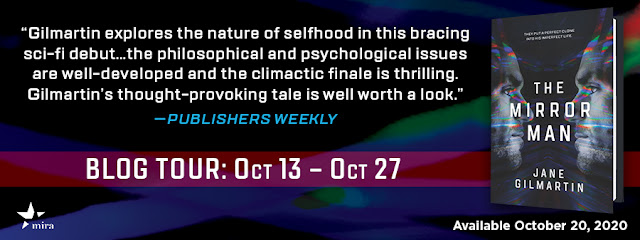The Mirror Man by Jane Gilmartin
Jeremiah is
given the chance of a lifetime. For $10 million, he will leave his life for a
year. A life where he is struggling to connect with his wife and son. The best part is no one will know because a
clone will be created to take his place. As part of the experiment, Jeremiah
will watch his clone for four hours a day and let the researchers know if the
clone does something out of character or if anyone suspects he is a clone. As
the experiment continues, Jeremiah realizes how far the researchers will go to
keep the experiment going, even if it means harming the people he loves. Jeremiah
needs a way out and reclaim his life before it is gone forever.
This
intriguing book is called, The Mirror Man, and it will be published
next week on 10 October. I was invited by the publisher to review book as part
of the blog tour. At first, I was unsure as I normally do not read “sci-fi”
books. I’m so glad I went out of my comfort zone and read this book. I was
hooked after the first chapter. The book opens with Jeremiah “downloading” his
information to his clone via a revolutionary drug, Meld. Then his clone is sent
home with no knowledge he is a clone and Jeremiah stays at the research
facility so they won’t risk crossing paths and so Jeremiah can watch his clone.
As you might expect, it was strange for Jeremiah to watch his clone on TV. He experienced
emotions such as jealousy when no one recognized that Jeremiah was not there
and it was his clone. He was also able to take a closer look to how he acts towards
other people and how they act towards him. He knew he had trouble connecting
with his family but did not realize how bad it was until he saw his clone live
his life.
I loved this
book and would highly recommend it. It was fascinating to think of having a
clone in real life and being able to watch yourself. It would be very
enlightening to watch yourself and get an outside view of how you are and how
people react to you. People talk about self-awareness and watching a clone live
your life is the ultimate self-awareness exercise.
The one area
I did not like about the book is I didn’t like that I never fully understand
why the experiment was taking place. The story said several times that high-ranking
people were very interested in the project but not what the long-term goal was.
It was not vital to the story but would have been interesting to know.
Q&A
Q. What
made you write this novel?
A. I love characters that are almost but not
quite human. My favorite Star Trek characters are always ones like Spock, Data,
and the Doctor from Voyager. Clones, to me, are about as almost human as you
can get. Some of my favorite science fiction stories deal with clones. But
there are so many good ones already out there I didn’t feel like I had anything
to add, and I never really set out to try.
But I was
reading something a few years ago that posed a straightforward and fascinating
question: What would it be like to meet your own clone? The article I was
reading left it at that, but I couldn’t stop thinking about it.
I knew it
might be interesting to write a clone story that focused not on the clone, but
on the human, who had been cloned. I thought that presented a whole new set of
ideas and issues within the topic. It sort of turns the whole thing around when
you look at it from that human perspective. What would it feel like to see
yourself replaced in your own life? There is something so creepy and sad about
that idea. Also, though, I saw something hopeful. I think it brings up the
possibility of making a change in your life or seeing the opportunity for a
second chance, which is always a good thing to explore. Those are some ideas I
tried to keep in mind as I was writing The Mirror Man.
Q. How did
you research this novel?
A. Because
the main focus of The Mirror Man is more the psychological
changes of the protagonist as he watches his clone, it isn’t a book that’s
especially science laden. That being said, the science (even though most is
invented) had to be believable and plausible and so, is based on real science.
For the
cloning aspect in the story I researched the way cloning is currently done in
mammals – via cell transfer and embryotic implantation. But I also needed to
identify ways in which scientists might grow a human clone quickly, so it would
reach a full, adult maturation rate in about 48 hours. I read a lot about Human
Growth Hormone (HGH) in the pituitary gland of our brains and its effect on how
our bodies grow. The research was intriguing and sent me down so many rabbit
holes dealing with the role this hormone plays in cell repair, muscle mass,
weight gain, and even life expectancy. The articles I saved and the notes I
took might well come in handy for a future novel.
I also did
some research for Meld, the invented drug in the story. I wanted to create a
drug that – if two people took it together – could offer a literal glimpse into
someone else’s mind but one that could also be used to transfer brain patterns
and consciousness from the main character into the clone. In the novel, the
drug is used in a myriad of ways – not only to copy a mind, but also as a
promising medical tool and as an illegal recreational drug with dire
consequences. For Meld I researched the areas of the human brain such a drug
might act upon – especially our aptly titled mirror neurons which are
responsible for making us yawn when we see someone else yawn. (If yours are
especially active, you might have yawned at the very thought of that. If so – sorry!)
Q. Do you
believe human cloning is possible?
A. As the
lead scientist in The Mirror Man likes to point out, “the science
exists.”
Human cloning
is absolutely possible. We are already so adept at cloning animals that there
are actual companies out there whose entire business model is built on cloning
our dogs and cats. And people do that more often than you’d imagine. Did you
know Barbara Streisand has had something like five clones of her favorite dog?
It’s true. And we all know the story of Dolly, the sheep with the dubious
distinction of being the very first mammal to be successfully cloned in 1996.
From dogs and cats and sheep it isn’t a giant leap to cloning humans.
Essentially, the science is the same. What’s stopping us (thankfully) isn’t the
feasibility, but the ethical and moral dilemmas associated with human cloning.
While many
countries have passed laws that prohibit human cloning, the US currently has no
such legislation (although some states do). Congress has proposed many bills to
that effect, but none have been enacted into actual law. The reason for that is
partly because things like medical stem cell research overlap the science of
cloning. But there are reams of material written on the ethical implications of
human cloning from agencies including the World Health Organization, and there
are ongoing congressional discussions to agree at least on some level of
regulation. But at the moment, in the US, human cloning is both scientifically
possible and essentially legal. That’s just a tiny bit terrifying.
Q. Talk
about the meaning of identity in your book.
A. It didn’t
take me long to understand that what I was really doing with The Mirror
Man was writing a story about self-identity. It’s a topic that finds
its way into a lot of what I write and is strangely compelling to me. My
favorite line from David Bowie’s song “Changes” is this: I turn myself to face me, but I never
caught a glimpse of how the others must see the faker
I find that
idea fascinating. We all have this idea of who we are, and how we come across
to other people, but it’s probably not the truth. The way we see ourselves is
muddled with all these filters and little lies. We are all, in a sense, just
fakers. I wanted to explore that concept, so I came up with a way to put a
character in a situation where he literally had to turn and face himself – to
see himself exactly as everyone else sees him -- from the outside. Cloning
seemed an obvious choice for a science fiction writer.
In the novel,
my character, Jeremiah is largely locked in this laboratory/apartment and made
to watch his clone on a TV monitor for four hours a day. Even though he’s
typically seeing mundane things – the clone interacting with his family and
co-workers – the experience is difficult and eye-opening for him. While he has
to admit that his double is every bit identical to him, he begins to despise
who he’s watching. It makes him question fundamental things about his own
identity.
Meanwhile, we
have this illegal street use of a drug called Meld that allows people to see
themselves through someone else’s eyes and it leads to a rash of suicides. It’s
another way of looking at what the main character is going through, but the
result is basically the same: It isn’t easy to face the truth of who you are.
There are a
lot of figurative and literal mirrors in my novel. Jeremiah is often looking at
his own reflection as he grapples with questions about his life. He spends
quite a bit of time creating an avatar of himself for a video game. And,
obviously, his clone is sort of the ultimate reflection. But he never fully
understands what he’s seeing until he’s forced to face himself. And I had to
bring him to that point in a very literal way. Hopefully, the novel will leave
readers asking some interesting questions about their own identity.
About the Author:
Jane
Gilmartin has been a news reporter and editor for several small-town weekly
papers and enjoyed a brief but exciting stint as a rock music journalist. A
bucket list review just before she turned 50 set her on the path to fiction
writing. Also checked off that list: an accidental singing career, attending a
Star Trek convention, and getting a hug from David Bowie. She lives in her
hometown of Hingham, Massachusetts.




Comments
Post a Comment